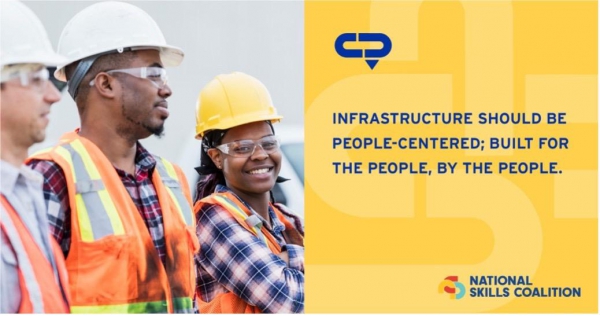Subscribe to Stay Informed
Dr. Mosser and Infrastructure Panel releases proposal to President Biden
Posted 07/02/21
As President Biden and Congress Negotiate Recovery Package, National Panel of Infrastructure Experts Sends Priorities to the Hill
If Congress Cuts Training Investments from Biden’s Plan, Local Workers Won’t Have Access to Infrastructure Jobs
National Skills Coalition (NSC) and Business Leaders United for Workforce Partnerships (BLU) today released a six-point policy proposal from its Infrastructure Recovery Panel to inform President Biden and Congress’s economic recovery negotiations. At the top of the list: ensure the President’s proposed investments in skills training and worker supports are included in Congress’s final infrastructure plan.
Dr. Daniel Mosser, president, West Virginia Northern Community College, served on the 21-member group of experts -- including business leaders, labor leaders, community college leaders, training providers, and others – called for a set of targeted investments and policies that are essential to any job creation efforts and the President’s goal of an equitable, sustainable recovery.
“We live in an era in which human capital is an increasingly scarce and critical natural resource for small, medium and large firms alike,” commented Mosser. “Businesses cannot find the workers they need to deliver core products and services. The need to invest in our nation’s crumbling infrastructure goes back decades. But infrastructure must be built and maintained by the people, for the people. We must invest in training and related supports along with bricks & mortar to ensure that American workers can access and benefit from these infrastructure jobs in their communities. Without investments in our people, America’s economic recovery will be anything but equitable.”
Panelists have been meeting with federal officials over the last month in advance of publicly releasing their recommendations. In addition to calling for the $100 billion investment in skills training in the President’s American Jobs Plan, the panel outlined six critical pillars for successful job creation and an inclusive recovery which can be viewed here: six-point policy proposal
Include local resident training and employment in plans for federal infrastructure projects by investing in skills training and worker supports like childcare and transportation, incentivizing local investments in training residents for infrastructure jobs, making investments in training provider capacity which is essential to local hire efforts, and measuring equitable employment outcomes by race, ethnicity, and gender.
Invest in local industry partnerships to develop targeted, local workforce solutions that meet the needs of workers and local employers.
Invest in equitable infrastructure career pathways by authorizing new Infrastructure Professional Opportunity Grants (IPOG), incentivizing employer investments in training at risk workers, funding integrated education and training to build foundational skills, and supporting equity and inclusion within labor and businesses through industry partnerships.
Expand short-term training and flexible apprenticeship by expanding Pell grants to cover high-quality, short-term training and expanding apprenticeship and work-based learning.
Help infrastructure workers and employers adopt and adapt to new technologies by making investments to help states pursue digital inclusion and skill building, investing in new Digital Literacy Upskilling Grants, and creating a new Infrastructure Extension Partnership program to help local companies adopt new technologies.
Support sustainable community outcomes beyond bricks, mortar, and jobs by adding metrics -- like useability and accessibility of infrastructure projects, growth in community wealth building, boosting local supply chains, expanding entrepreneurship, and improving community health outcomes -- to more traditional measurements of success like roads repaired, schools built, growth in clean energy use, and the number of community members who obtain career path employment.
NSC and BLU convened four recovery panels for the following industries: Healthcare, Manufacturing, Infrastructure, and Retail/Hospitality. The other three panels will release their recommendations in the coming weeks.
